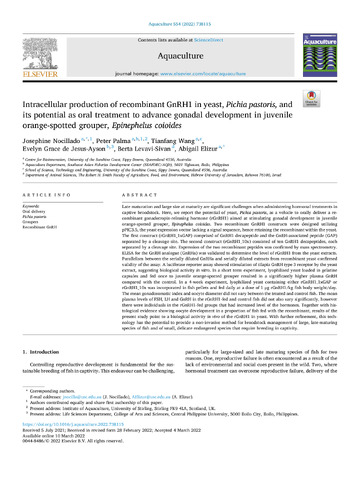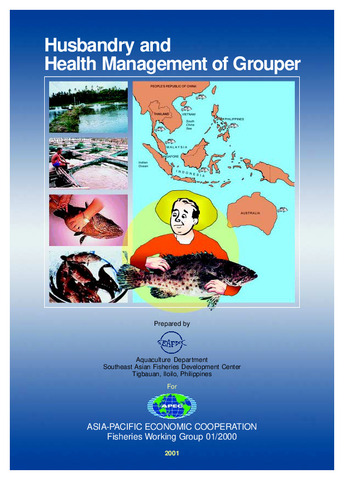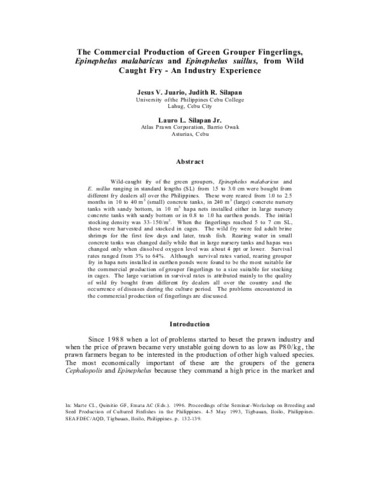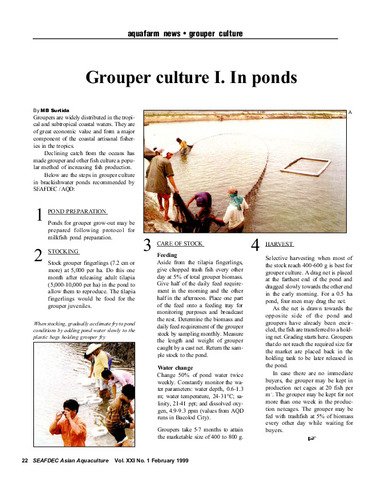Intracellular production of recombinant GnRH1 in yeast, Pichia pastoris, and its potential as oral treatment to advance gonadal development in juvenile orange-spotted grouper, Epinephelus coioides
Share
Abstract
Late maturation and large size at maturity are significant challenges when administering hormonal treatments in captive broodstock. Here, we report the potential of yeast, Pichia pastoris, as a vehicle to orally deliver a recombinant gonadotropin-releasing hormone (rGnRH1) aimed at stimulating gonadal development in juvenile orange-spotted grouper, Epinephelus coioides. Two recombinant GnRH1 constructs were designed utilizing pPIC3.5, the yeast expression vector lacking a signal sequence, hence retaining the recombinant within the yeast. The first construct (rGnRH1_1xGAP) comprised of GnRH1 decapeptide and the GnRH-associated peptide (GAP) separated by a cleavage site. The second construct (rGnRH1_10x) consisted of ten GnRH1 decapeptides, each separated by a cleavage site. Expression of the two recombinant peptides was confirmed by mass spectrometry. ELISA for the GnRH analogue (GnRHa) was validated to determine the level of rGnRH1 from the yeast extracts. Parallelism between the serially diluted GnRHa and serially diluted extracts from recombinant yeast confirmed validity of the assay. A luciferase reporter assay showed stimulation of tilapia GnRH type 3 receptor by the yeast extract, suggesting biological activity in vitro. In a short term experiment, lyophilised yeast loaded in gelatine capsules and fed once to juvenile orange-spotted grouper resulted in a significantly higher plasma GnRH compared with the control. In a 4-week experiment, lyophilized yeast containing either rGnRH1_1xGAP or rGnRH1_10x was incorporated in fish pellets and fed daily at a dose of 1 μg rGnRH1/kg fish body weight/day. The mean gonadosomatic index and oocyte diameter did not vary between the treated and control fish. The mean plasma levels of FSH, LH and GnRH in the rGnRH1-fed and control fish did not also vary significantly, however there were individuals in the rGnRH1-fed groups that had increased level of the hormones. Together with histological evidence showing oocyte development in a proportion of fish fed with the recombinant, results of the present study point to a biological activity in vivo of the rGnRH1 in yeast. With further refinement, this technology has the potential to provide a non-invasive method for broodstock management of large, late-maturing species of fish and of small, delicate endangered species that require breeding in captivity.
Suggested Citation
Nocillado, J., Palma, P., Wang, T., de Jesus-Ayson, E. G. T., Levavi-Sivan, B., & Elizur, A. (2022). Intracellular production of recombinant GnRH1 in yeast, Pichia pastoris, and its potential as oral treatment to advance gonadal development in juvenile orange-spotted grouper, Epinephelus coioides. Aquaculture , 554, 738115. https://doi.org/10.1016/j.aquaculture.2022.738115
Subject
Taxonomic term
Collections
- AQD Journal Articles [1249]
Related items
Showing items related by title, author, creator and subject.
-
Husbandry and health management of grouper
Asia-Pacific Economic Cooperation; Southeast Asian Fisheries Development Center (Asia-Pacific Economic Cooperation; Aquaculture Department, Southeast Asian Fisheries Development Center, 2001)The groupers (Family Serranidae) are among the most popular species in the live reef food fish industry in the Asia-Pacific region. Groupers are generally fast growing, hardy, suitable for intensive culture, and with ... -
The commercial production of green grouper fingerlings, Epinephelus suillus, from wild caught fry - an industry experience
Juario, Jesus V.; Silapan, Judith R.; Silapan Jr., Lauro L. (Aquaculture Department, Southeast Asian Fisheries Development Center, 1996)Wild-caught fry of the green groupers, Epinephelus malabaricus and E. suillus ranging in standard lengths (SL) from 1.5 to 3.0 cm were bought from different fry dealers all over the Philippines. These were reared from 1.0 ... -
Grouper culture
Surtida, Marilyn B. (Aquaculture Department, Southeast Asian Fisheries Development Center, 1999)




